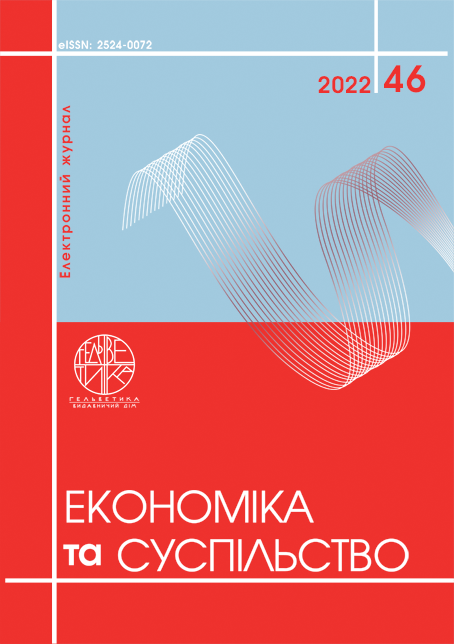VALUE PRIORITIES TRANSFORMATION OF UKRAINE IN THE CURRENT CONDITIONS OF EUROPEAN INTEGRATION
Abstract
The article is devoted to the study of cultural and economic values as one of the elements of economic reality management. The purpose of the article is to analyze the prerequisites and directions for the value orientations and priorities transformation in Ukraine. The work uses the method of analysis based on the study of literature in the field of value priorities transformation in European countries. The author consider political determinants of the liberalism development and liberal values as the basis of the market economy in the Western Europe countries. The article defines basic four most important dimensions of cultural values, which are the basis of economic and social behavior, modernization. It has been established that the transition from one cultural dimension to another ensures socio-cultural and, as a result, economic modernization. Socio-cultural modernization is one of the factors of regulation of economic reality. The key universal human values are defined as the basis for cultural, social, and economic transformation in Ukraine in the conditions of European integration. The transition from centralized to decentralized management, from collectivist to individualist values should become the basis for the value priorities transformation in Ukraine in the context of European integration. In the strategy of socio-cultural development of Ukraine, it is expedient to include measures to spread the importance of individualistic human aspirations and one's own responsibility for self-realization. This will contribute to the formation of the values of self-expression and personal growth, a change in cultural, social, and economic behavior. Practical value. Respect for women's rights, popularization of personal responsibility, and social equality are important components of socio-cultural modernization. Spreading the narrative of equality of different social groups, regardless of age, gender, income, status, should contribute to social equality in Ukraine. Social and cultural terms of human communities form a certain order of life, establish moral norms, traditions, behaviors, and so on.
References
Abrhám J., Bilan Y., Krauchenia A., Strielkowski W. Planning horizon in labour supply of Belarusian small entrepreneurs. Economic Research-Ekonomska Istraživanja. 2015. Vol. 28(1). P. 773–787. DOI: https://doi.org/10.1080/1331677X.2015.1084238
Cábelková I., Strielkowski W. Is the level of taxation a product of culture? A cultural economics approach. Society and Economy. 2013. Vol. 35(4). P. 513–529. DOI: https://doi.org/10.1556/SocEc.2013.0007
Gaweł A. The Relationship between Entrepreneurship and Unemployment in the Business Cycle. Journal of International Studies. 2010. Vol. 3(1). P. 59-–69.
Hofstede G., Neuijen B., Ohayv D. D., Sanders G. Measuring organizational cultures: A qualitative and quantitative study across twenty cases. Administrative science quarterly. 1990. Vol. 35. P. 286–316.
Inglehart, R., Baker W. E. Modernization, cultural change, and the persistence of traditional values. American sociological review. 2000. Vol. 65. P. 19–51.
Koudelková P., Strielkowski W., Hejlová D. Corruption and System Change in the Czech Republic: Firmlevel Evidence. DANUBE: Law and Economics Review. 2015. Vol. 6(1). P. 25–46. DOI: https://doi.org/10.1515/danb-2015-0002
Stimac H., Simic M. L. Competitiveness in higher education: A need for marketing orientation and service quality. Economics & Sociology. 2012. Vol. 5(2). P. 23.
Strielkowski W., Weyskrabova B. Ukrainian labour migration and remittances in the Czech Republic. Tijdschrift voor economische en sociale geografie. 2014. Vol. 105(1). P. 30–45. DOI: https://doi.org/10.1111/tesg.12052
Ustubici A., Irdam D. The Impact of Remittances on Human Development: a Quantitative Analysis and Policy Implications. Economics & Sociology. 2012. Vol. 5(1). P. 74–95.
Yakovets T. Of the driving forces of social development. The Philosophy of Economy. 2012. Vol. 4. P. 33–37.
Abraham, J., Bilan, Y., Krauchenia, A., & Strielkowsky, W. (2015). Planning horizon in labour supply of Belarusian small entrepreneurs. Economic Research-Ekonomska Istraživanja, 28(1), 773–787. DOI: https://doi.org/10.1080/1331677X.2015.1084238
Chabelkova, I., & Strielkowsky, W. (2013). Is the level of taxation a product of culture? A cultural economics approach. Society and Economy, 35(4), 513–529. DOI: https://doi.org/10.1556/SocEc.2013.0007
Gawel, A. (2010). The Relationship between Entrepreneurship and Unemployment in the Business Cycle. Journal of International Studies, 3(1), 59–69.
Hofstede, G., Neuijen, B., Ohayv, D. D., & Sanders, G. (1990). Measuring organizational cultures: A qualitative and quantitative study across twenty cases. Administrative science quarterly, 35, 286–316.
Inglehart, R., & Baker, W. E. (2000). Modernization, cultural change, and the persistence of traditional values. American sociological review, 65, 19–51.
Koudelkova, P., Strielkowsky, W., & Hejlova, D. (2015). Corruption and System Change in the Czech Republic: Firmlevel Evidence. DANUBE: Law and Economics Review, 6(1), 25–46. DOI: https://doi.org/10.1515/danb-2015-0002
Stimac, H., & Simic, M. L. (2012). Competitiveness in higher education: A need for marketing orientation and service quality. Economics & Sociology, 5(2), 23.
Strielkowsky, W., & Weyskrabova, B. (2014). Ukrainian labour migration and remittances in the Czech Republic. Tijdschrift voor economische en sociale geografie, 105(1), 30–45. DOI: https://doi.org/10.1111/tesg.12052
Ustubici, A., & Irdam, D. (2012). The Impact of Remittances on Human Development: a Quantitative Analysis and Policy Implications. Economics & Sociology, 5(1), 74–95.
Yakovets, T. (2012). Of the driving forces of social development. The Philosophy of Economy, 4, 33–37.


